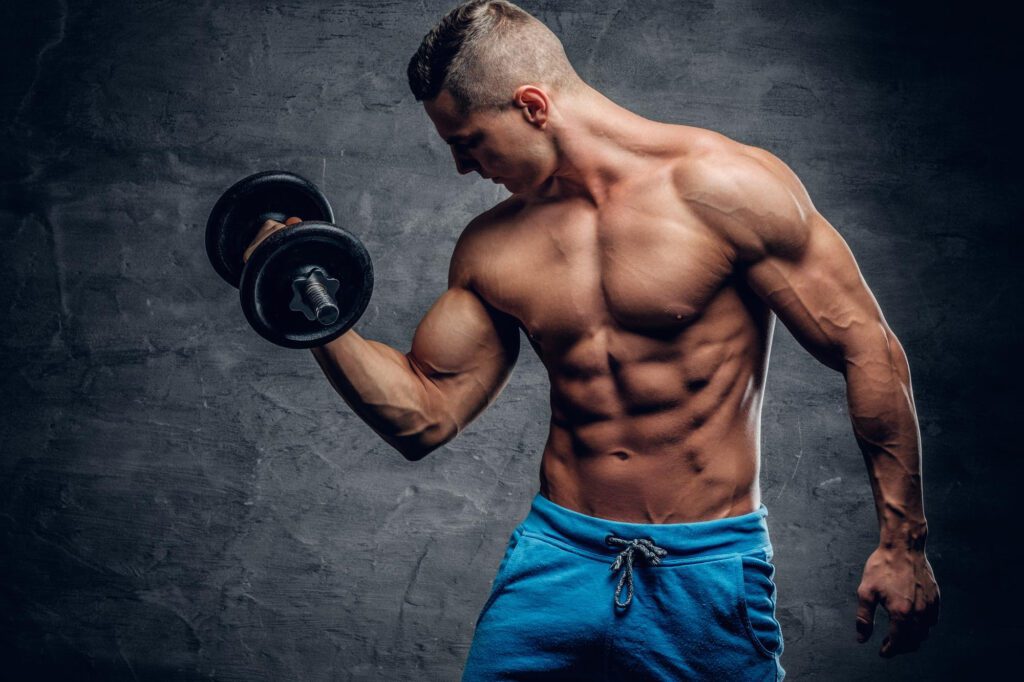What Are Genes or Genetics?

The study of genes and heredity is genetics, which focuses on the investigation of how genes pass down from one generation to another and how they shape our traits and predispositions. Genes, which are segments of DNA containing instructions for constructing and maintaining our bodies, serve as blueprints that direct the development, functioning, and growth of all living organisms. You will learn through this useful article that “Does Genetics Play a Role in Muscle Building”
Introduction
Genes and genetics play a fundamental role in shaping who we are. They determine our physical characteristics, influence our health, and even impact our athletic abilities. In the context of muscle building, genetics indeed play a crucial role in determining an individual’s muscle development potential, strength, and overall athletic performance.
Understanding Genes
Genes are the things that determine traits in living things. They carry the info that makes you who you are. Each gene consists of a unique DNA sequence that acts as a code to create particular proteins. Proteins are vital for our bodies. They are the building blocks and carry out essential functions.
The Role of Genes in Muscle Building
Genetics plays a big role in muscle building. It affects how easily someone gains muscle and strength. Genes influence muscle tissue type, size, and strength.
There are two main types of muscle fibers: slow-twitch (Type I) and fast-twitch (Type II). Slow-twitch fibers don’t tire easily and are good for endurance activities. Fast-twitch fibers generate power and strength. Genetics influence the fiber type proportion in a person’s muscles.
Genetic Variations and Muscle-Building Potential
Genetic variations, or polymorphisms, in specific genes, can also impact muscle-building potential. Certain genes are associated with muscle growth, strength, and response to exercise. The ACTN3 gene affects our muscles and athletic abilities.
Gene Expression and Muscle Development
Environmental cues, hormones, and lifestyle choices, among other factors, regulate gene expression, a process that can turn genes on or off. In the context of muscle building, gene expression critically determines how exercise activates genes to promote muscle growth and adaptation.
Genetic Testing and Muscle Building
Genetic testing has advanced and now can reveal valuable insights about a person’s muscle-building potential based on their genetic makeup. These tests can spot variations in specific genes that might affect muscle growth, how nutrients are metabolized, injury risk, and recovery speed. When people understand their genetic profiles, they can tailor their training and nutrition plans to better suit their bodies and improve their muscle-building progress.
Nature vs. Nurture: Genetics and Muscle Building
Genes set our muscle growth base, but exercise, diet, and lifestyle also matter. They can change gene activity and boost muscle growth. Good training and habits can help, even with certain genes.
Genetic Limitations in Muscle Building
Genetic factors also impose limitations on muscle building. Each individual has a unique genetic potential for muscle development, influenced by factors such as muscle fiber composition, metabolic capacity, and hormone levels. It’s important to understand and accept these genetic limitations while striving to maximize one’s individual potential through focused training and appropriate nutrition.
Training Strategies Based on Genetics
A person’s genetic profile can help shape the best training program for muscle growth. It can advise on the right exercises, how much and how hard to work out, and how to recover. For example, people with more fast-twitch fibers could gain from strength training, while those with more slow-twitch fibers might do better with endurance activities.
Nutrition and Genetics for Muscle Building
Nutrition plays a vital role in muscle building, and genetic variations can influence an individual’s response to certain nutrients. Nutrigenomics is the study of how genes interact with nutrients, and it highlights the importance of personalized nutrition. Understanding an individual’s genetic predispositions can help in tailoring macronutrient ratios, vitamin and mineral intake, and dietary strategies for optimal muscle development.
Epigenetics and Muscle Building
Epigenetics refers to changes in gene expression that occur without altering the underlying DNA sequence. Lifestyle factors, such as exercise, diet, stress, and sleep, can influence epigenetic modifications, thereby affecting muscle development. By adopting healthy habits and creating an environment conducive to gene expression that favors muscle growth, individuals can further enhance their muscle-building progress.
Harnessing Genetics for Optimal Muscle Building
Integrating genetic knowledge into training and nutrition plans can lead to more personalized and effective approaches to muscle building. Working with professionals who understand the interplay between genetics, exercise, and nutrition can help individuals optimize their genetic potential and achieve their muscle-building goals.

Genetics and Muscle Building: Case Studies
Examining real-life examples of individuals with different genetic profiles can provide insights into the influence of genetics on muscle building. By studying athletes or individuals with exceptional muscle development, we can identify common genetic factors that contribute to their success. Additionally, analyzing cases where individuals face challenges in muscle building despite diligent efforts can shed light on the impact of genetic limitations.
Genetics, Muscle Building, and Overall Health
Beyond the realm of muscle building, genetics also have implications for overall health. Individuals with a higher muscle mass tend to have better metabolic health, improved insulin sensitivity, and reduced risk of chronic diseases such as obesity, diabetes, and cardiovascular conditions. Therefore, understanding the genetic factors that contribute to muscle development not only benefits athletic performance but also promotes long-term well-being.
Final Thoughts
Genes and genetics play a significant role in muscle building. From determining muscle fiber composition to influencing gene expression and response to exercise and nutrition, genetics shape an individual’s muscle-building potential. While genetics provide a foundation, it’s essential to acknowledge the interplay between genes and environmental factors and strive for personalized approaches that optimize genetic potential. By harnessing the power of genetic knowledge, individuals can tailor their training, nutrition, and lifestyle choices to achieve optimal muscle development and overall health.
FAQ’s
Can everyone build muscle regardless of their genetics?
Yes, everyone has the potential to build muscle, although the rate and extent of muscle development may vary based on genetic factors.
Can genetic testing accurately predict muscle-building capabilities?
Genetic testing can provide insights into genetic variations related to muscle building, but it cannot guarantee specific outcomes or accurately predict individual muscle-building capabilities.
Are genetics the only determining factor in muscle building?
No, genetics is just one factor. Other factors such as training, nutrition, lifestyle choices, and overall dedication also significantly impact muscle-building progress.
Can individuals with less favorable genetics for muscle building still make progress?
Absolutely! While genetics can influence muscle-building potential, individuals with less favorable genetics can still make significant progress by following a well-designed training program and nutrition plan.
Should individuals with specific genetic variations follow different training or nutritional strategies?
Tailoring training and nutrition strategies based on genetic variations can be beneficial. Working with professionals who understand the interplay between genetics and muscle building can help develop personalized approaches.
Can genetics determine the rate at which muscle is gained or lost?
Yes, genetics can influence the rate at which muscle is gained or lost. Some individuals may experience faster muscle growth, while others may have a slower rate of muscle development or be prone to muscle loss.
Can genetics impact muscle recovery and injury risk?
Yes, genetic variations can affect muscle recovery and injury risk. Certain genes are involved in processes such as inflammation, collagen synthesis, and tissue repair, which can influence an individual’s ability to recover from exercise-induced muscle damage and their susceptibility to injuries.
Are there specific genetic factors that determine muscle strength?
Yes, genetic factors can influence muscle strength. Variations in genes associated with muscle fiber composition, muscle contractile proteins, and neuromuscular functioning can contribute to differences in strength levels among individuals.
Can individuals with a family history of muscular diseases still build muscle?
Yes, individuals with a family history of muscular diseases may still be able to build muscle. However, it’s important to work closely with healthcare professionals to understand any potential risks, manage the condition, and design appropriate training and nutrition strategies.
Are there genetic factors that impact muscle response to resistance training?
Yes, genetic factors can influence an individual’s muscle response to resistance training. Genes involved in muscle protein synthesis, muscle hypertrophy, and muscle fiber recruitment can contribute to individual differences in muscle growth and strength gains in response to resistance exercise.
Remember, while genetics can provide insights into individual predispositions, they are not the sole determinants of your muscle-building journey. By adopting a well-rounded approach that incorporates tailored training, proper nutrition, and lifestyle choices, you can optimize your muscle-building potential and achieve your fitness goals.



